… And why some say San Francisco needs a Housing Commission to deal with the biggest issue in the city
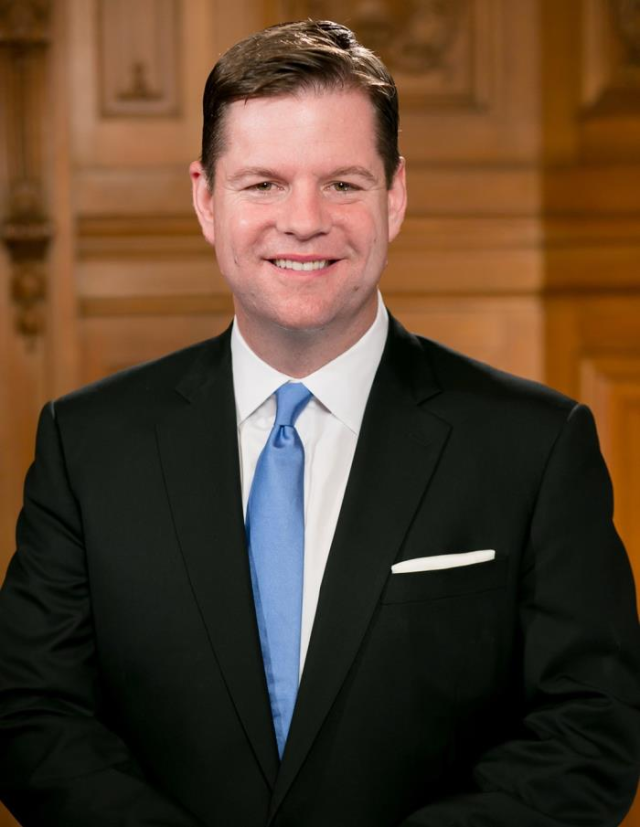
By Tim Redmond
JUNE 29, 2015 – The way most of the press has portrayed it, all is happiness and joy around the city budget: The supervisors and the mayor have come to terms, there’s lots of money to spend, everyone got what he or she wanted … let’s all join hands and sing.
But there’s a twisted side to this that got passing mention in the Examiner but has activists all over the city shaking their heads.
The one thing the city couldn’t seem to do, with a budget of nearly $9 billion, was allocate another $1 million – a tiny fraction of the money that was being batted around at the end – for what ought to be among the city’s highest priorities right now: Providing legal representation for people facing evictions.
What happened to that money? Well, Sup. Mark Farrell, the head of the Budget Committee, made it clear to the Ex that he and his colleagues (or some of them, anyway) were unhappy with the fact that tenant advocacy groups that were getting some of that money were also doing … tenant advocacy.
“As it related to some of the eviction defense asks there was concern from a number of colleagues both around the past effectiveness of these organizations and second of all a frustration that some of them have been here over the past few months demonstrating on certain political issues — whether it be organizing around the Mission moratorium or other things.”
Actually, you can’t seriously challenge the “past effectiveness” of groups that have gotten city money for eviction defense. See this, and this and so much more. Eviction defense lawyers are a key player in fighting Ellis Act and illegal Owner-Move-In and nuisance evictions, and the more money there is to support that program, the fewer bogus evictions will happen.
Nobody has ever suggested that the meager funds going to eviction defense are misspent, or wasted; I know a lot of the lawyers who are doing this work, and they are paid far less than city attorneys and public defenders, and they work nonstop handling heavy case loads to save people’s homes.
No: What Farrell is mad about is that fact that some of the same people and groups that defend tenants are coming to City Hall and complaining that that the supervisors aren’t doing enough to stop the speculators and greedheads who are destroying entire neighborhoods.
Clue phone, Supervisor Farrell: That is what tenant advocates do. You want to punish the Public Defender’s Office because Jeff Adachi speaks out against police abuse? You going to cut the budget for the District Attorney’s Office because George Gascon supported Prop. 47?
If Farrell thinks city money earmarked for eviction defense wound up paying for legislative activism, let him product evidence. I don’t think there is any. Otherwise, what he has done is harm tenants because he doesn’t like people marching around City Hall protesting him and his policies.
That’s a really, really bad precedent.
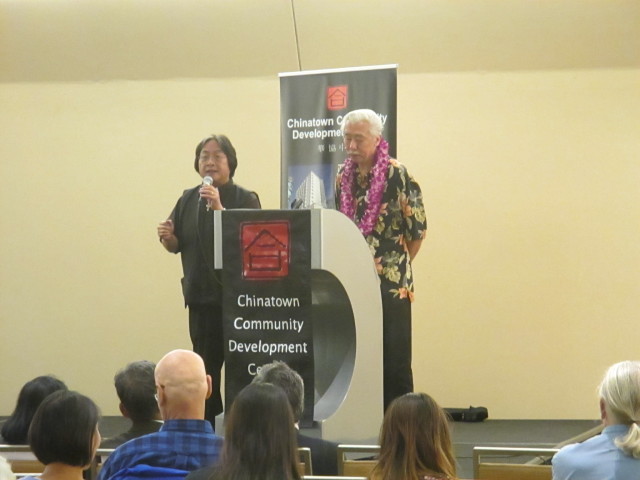
I’ve just started reading Gordon Chin’s book on the history of community organizing in Chinatown, but it looks fascinating. Chin is, of course, one of the founders of the Chinatown Community Development Center, and an icon in the city – and you could tell by looking around the packed room at the Chinese Cultural Center where he spoke.
In the front row: Two mayors (Willie Brown and Ed Lee), Rose Pak, Aaron Peskin, and Sup. Julie Christensen – not people who are always getting along these days, but they all turned out to show respect for Gordon Chin.
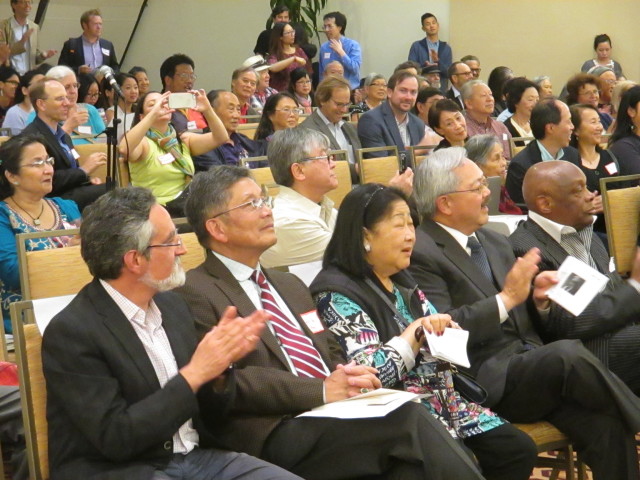
Much of city government will be slowing down this week as we head for the July 4 holiday weekend, but the Planning Commission has an interesting item Thursday/2. The panel will be discussing a bill by Sup. John Avalos that would require “group housing” projects to abide by the inclusionary housing laws.
Sup. Julie Christensen has proposed amendments that would make it easier for downtown developers to add housing to mixed-use projects if it’s affordable.
You can read the whole memo on this here.
The reason this has even come up is that the nature of housing in this city is changing so fast that some old rules we figured would last forever are now becoming irrelevant.
Most people in the housing-policy world have figured that residential hotels would remain relatively affordable because rich people wouldn’t want to live in small rooms with no kitchen and shared baths. But now developers are looking at “group housing” as a market-rate (read: expensive) alternative for young tech workers (who get fed at the office and are hardly ever home anway).
So now we have market-rate housing that doesn’t have to provide any affordable units.
The Avalos measure will probably get the commission’s approval, but it’s a warning that the old assumptions about “naturally affordable” housing are gone.
Which also means that neighborhoods like the Tenderloin, where a lot of us figured gentrification would never be an issue, are at risk. Not as much as other parts of town, since so much Tenderloin housing is in the hands of nonprofits – but still.
A few blocks from Twitter? Little room with a shared bath? Will $2,000 a month seem like a bargain?
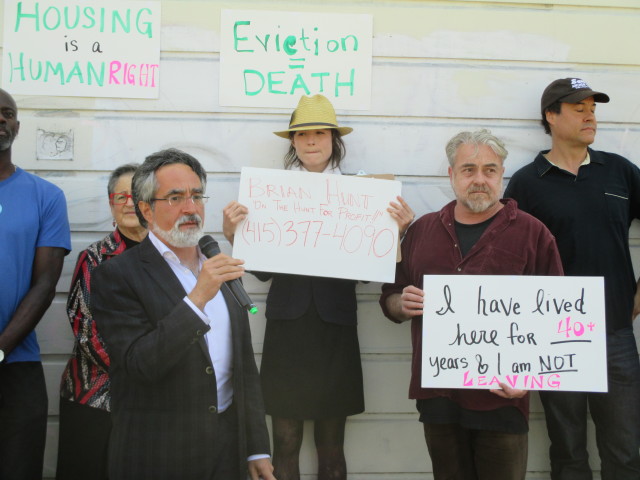
I sometimes think I could go to a press conference on an eviction every single day, that many people are getting thrown out of their homes. The latest was on Broadway and Larkin, where Peskin and Sup. Jane Kim rallied against yet another Ellis Act eviction.
It gave Kim a chance to promote her latest tenants-rights bill, which would eliminate the ability of a landlord to do a bogus eviction then raise the rent on new tenants by requiring that the rent on any apartment vacated by an Owner-Move-In eviction stay the same as it was before the eviction.
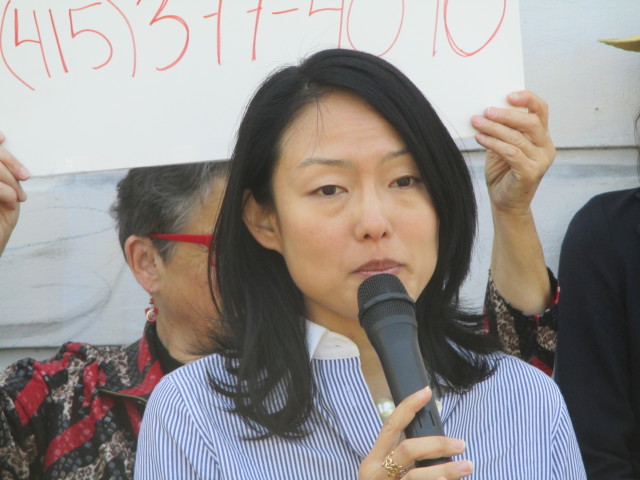
We shall see if there are six votes for this, or if, as on so many other issues, the conservatives on the board can c0ntrol a 6-5 vote.
Which brings up an issue that’s been nagging activists for quite a while. The City Planning Department doesn’t seem to be able to address the central issue of our time, which is housing, in any kind of coherent way. Discussions are project-by-project. Everything (including the funding) is developer-driven. Planning enforcement, as we are constantly reminded, is based only on complaints.
Airbnb essentially took over huge swaths of the city’s housing stock while Planning did nothing. When then-Sup David Chiu’s legislation to legalize short-term rentals came forward, the department, then the commission, bungled it.
So some are asking why, at a time like this, San Francisco doesn’t create a Housing Commission.
Housing is more important than anything else in the city right now. It’s the key to whether San Francisco will continue to be a functioning urban area. You can’t talk about crime, public health, transportation, or much of anything else without talking housing.
So why is it relegated to the Mayor’s Office of Housing, which has no public oversight, no hearings, and pretty much operates behind closed doors, and the Planning Commission, which can’t handle its current burden and is in no position to craft visionary policy (or even enforce what we have?)
Yeah, more government and all that. But it’s hard to argue with the facts: San Francisco is in the worst housing crisis since the earthquake of 1906 – and there is no City Hall infrastructure that seems capable of dealing with it.
Why, for example, don’t we charge housing-impact nexus fees on market-rate housing? How do we deal with laws that forbid second-units and call for their removal at the same time that we want to stop the removal of second units (which can lead to a two-unit building becoming exempt from rent control?)
What should the city’s role be as a housing provider?
Maybe a new Housing Commission could take over the work of the Housing Authority Commission, which over the years has done a pretty crappy job of managing public housing.
I first heard this suggestion from Tom Radulovich. It makes a certain amount of sense.





